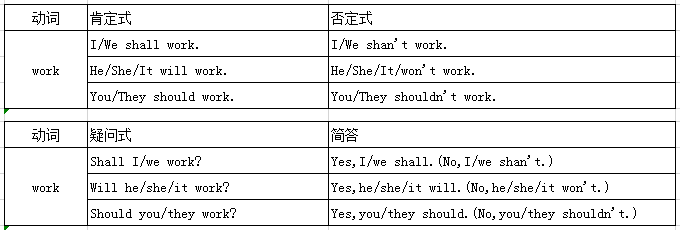一、一般将来时的构成
现将行为动词(以work为例)的一般将来时的肯定式,否定式和疑问式的构成列表如下:

一般将来时由shall/will动词原形构成。shall只用于第一人称。shall not可缩写为shan't;will not可缩写为won't。
二、一般将来时的用法
1.表示将来某个时间要发生的动作或存在的状态,常与表示将来的时间状语连用。如:tomorrow,the day after tomorrow,next week(day,month,year),in...等。如:
I'll go to my hometown in a week.
一周后我将回老家。
She will be nineteen years old next year.
她明年将19岁了。
We shan't( won't) be free tonight。
我们今天晚上没有时间。
2.表示将来经常或反复发生的动作及一种倾向性动作。如:
Whenever I'm in trouble,he'll come to help me.
无论什么时候我有困难,他都会来帮我。
We will come to see you every Sunday.
每星期天我们都会来看你。
We'll die without air or water.
没有空气或水我们会死。
三、将来时的其他表示法
1.be going to+动词原形表示即将发生的事,打算、计划要做的事,表示很近的将来。如:
We are going to build a hospital here.
我们打算在这儿建一所医院。
He's going to spend his holidays in Guilin.
他准备在桂林度假。
2.be+动词不定式表示接计划安排要发生的事或用来征求对方意见。如:
I'm to see Mr.Brown off this afternoon.
我今天下午要去送布朗先生。
When are they to hand in their plan?
他们的计划什么时候交上来?
3.某些动词(如come,8o,start, leave等)可用一般现在时表示按计划的将来或时刻表要发生的动作。如:
The plane leaves at six.
飞机六点起飞。
When does the winter vacation begin?
寒假什么时候开始?
4.某些动词(如come,go,start,arrive,leave,return等)可用现在进行时表示按计划或安排即将要进行的动作。如:
He is coming to see me on Tuesday.
他星期二要来看我。
We are going to the theater tonight.
我们今晚去看戏。
He is arriving in Beijing this afternoon.
他今天下午会到北京。
相关专题:


